News
FG foreign scholarship beneficiaries lament unpaid eight-month stipends
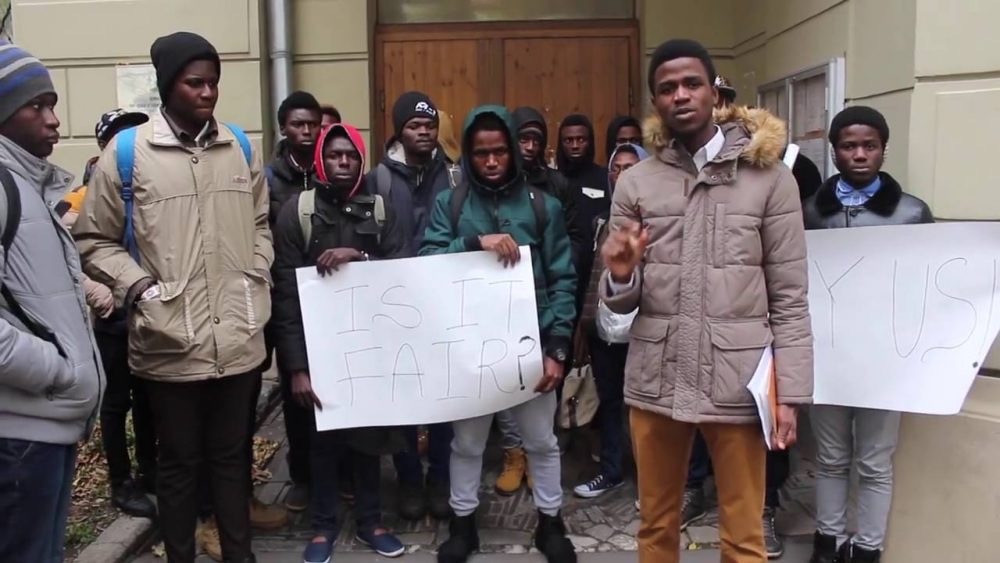
Nigerian students studying in Russia, Morocco, Algeria, China, Hungary, and other countries, on the Federal Government’s scholarship have lamented their unpaid stipends for eight months running.
The students are studying under the Federal Government’s Bilateral Educational Agreement Scholarship.
The BEA scholarship is for the purpose of education exchange between Nigeria and the partnering countries.
The scholarship scheme is being supervised by the Federal Scholarship Board under the Federal Ministry of Education.
In a statement on Wednesday, the President of the Union of Nigerian Students under the Federal Government-controlled Bilateral Educational Agreement Scholarship, Ayuba Anas, said the scholars had not been paid for close to eight months.
Anas said, “For the past six to eight months, scholars enrolled in various institutions abroad have endured financial strain due to the delay in receiving their stipends.
“In addition, from the last payments we received (March-August), there was a shortfall of practically two and a half months’ payment. Moreover, some students in China have not received any stipends since they arrived in April and May 2023.
“This delay has led to dire consequences, especially for those residing in countries like Morocco, where the country doesn’t have adequate provisions for school hostels, unlike the other sister BEA countries. This means that stipends are crucial for covering basic expenses such as housing, electricity bills, handouts, internet bills, water bills, transportation, and food.
“Regrettably, some students have faced eviction as they struggled to meet rent payments, while others have tragically fallen ill due to hunger, requiring urgent medical attention. These hardships persist amidst the ongoing delay in stipend disbursement.”
According to Anas, scholars in Russia “are grappling with the harsh reality of an increased cost of living, exacerbated by the prolonged delay in stipend disbursement.”
“Forced to navigate financial hardships amidst the pressures of academic stress, many students have been pushed to the breaking point which is diverting their focus from their primary goal of academic excellence,” he said.
The students said while they were aware of the current economic realities back home in Nigeria, the terms of the education exchange programme did not allow them to take up any job to aid themselves.
They implored the Federal Government to recognise their plight and take immediate action to alleviate their suffering.
“We earnestly plead with our President, President Bola Ahmed Tinubu, as a father figure and a visionary in education, to intervene in this pressing matter.
“His intervention in ensuring the prompt disbursement of our stipends will not only alleviate our current hardships but also allow us, his scholars, to focus wholeheartedly on our studies. We are confident that under President Tinubu’s compassionate and forward-thinking leadership, swift action will be taken to resolve this issue, enabling us to continue our academic pursuits without the burden of financial strain.”
No official at the Federal Ministry of Education replied to inquiries by our correspondent on the matter at the time of filing this report.
News
PHOTOS: Glamour as dignitaries, royals attend Alaafin’s coronation
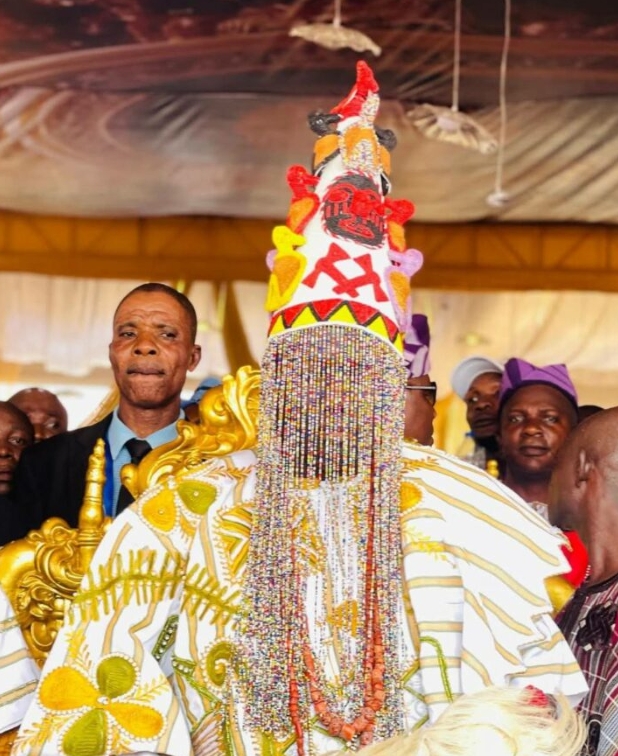
By Kayode Sanni-Arewa
Dignitaries from across the nation gathered at Olivet Baptist High School, Oyo, on Saturday to witness the coronation of the 46th Alaafin of Oyo, Oba Abimbola Owoade
The historic event drew a distinguished crowd, including President Bola Tinubu, represented by the Minister of Power, Chief Adebayo Adelabu; the Governor of Oyo State, Seyi Makinde; former Deputy Governor, Ambassador Taofeek Arapaja; Speaker of the Oyo State House of Assembly, Rt. Hon.Debo Ogundoyin; and Senator Yunus Akintunde, representing Oyo South, among other notable figures.
Alaafin of Oyo, Oba Abimbola Owoade I and his Wife Abiwumi Owoade.
Royalty was richly represented as well, with the presence of revered monarchs such as the Ooni of Ife, Oba Adeyeye Ogunwusi; the Soun of Ogbomoso, Oba Ghandi Olaoye; and the Oluwo of Iwo, Oba Abdulrosheed Akanbi, adding grandeur and cultural depth to the occasion.
News
Passengers Escape Death By Whiskers As Bus Burst Into Flames In Lagos
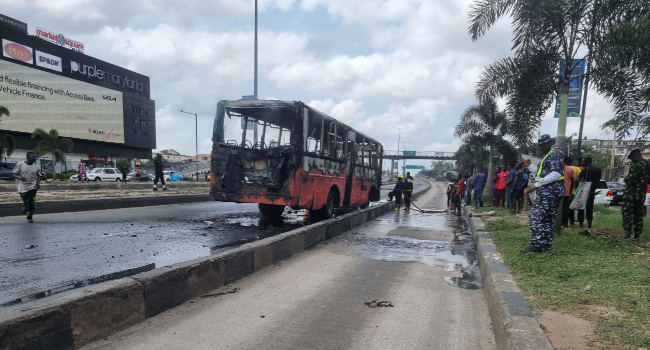
The driver and conductor of a BRT bus have fled for their lives, abandoning passengers to their fate, as a BRT bus caught fire at Maryland, Lagos State, on Saturday morning.
Our correspondent, who was at the scene of the incident, said that the vehicle departed from Ikorodu en route to CMS when the sad incident occurred.
As of the time this report was filed, emergency responders, including officers of the Nigeria Police Force, the Lagos State Traffic Management Authority (LASTMA), fire services, and local security personnel, arrived at the scene to contain the blaze.
Firefighters at the scene.
One of the passengers on the bus told our correspondent the fire started as smoke from the driver’s side.
According to her, the passengers initially thought the smoke emanated from other buses; however, the slight smoke soon worsened, immediately sending them into panic mode.
“As soon as we saw that the smoke grew bigger, we immediately rushed off the bus before the fire ignited”, she said, adding that none of the passengers sustained any injury.
She added that the driver fled the scene immediately after the fire started.
“The driver and the conductor ran away. They didn’t even wait to see what would happen to us.
“Definitely, they knew what happened. They knew the bus was bad before putting it on the road and risking our lives,” she alleged.
Channels
News
VOA Halts Operations In Nigeria, Others Over President Trump
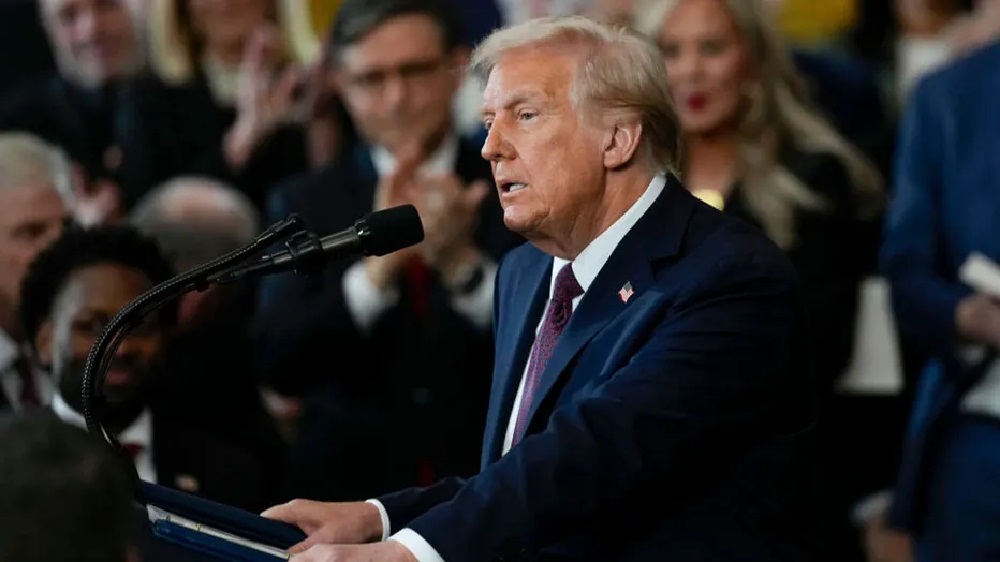
The United States-funded Voice of America (VOA) has gone off air in Nigeria, Ghana, Niger, and several other African countries after President Donald Trump cut financial support to the global broadcaster.
The shutdown, first noticed by millions of listeners in northern Nigeria, sparked panic when music began playing in place of scheduled broadcasts, a haunting reminder in the region of military coups or political takeovers.
“People started calling in, worried that there had been a coup in America,” Babangida Jibrin, a journalist who worked with VOA’s now-defunct Hausa-language service was quoted by Daily Trust.
The station’s abrupt disappearance from the airwaves last month left stunned reporters scrambling to explain what had happened to their loyal audience.
VOA’s Hausa service, a lifeline for millions of listeners in rural and conflict-prone areas of Nigeria, Ghana, Cameroon, and Niger, had become a trusted source of international and regional news, especially in places where local media is either censored, inaccessible, or compromised by state influence.
With internet access unreliable or non-existent in these regions, shortwave and radio broadcasts like VOA filled a crucial void.
“People are now cut off from the world, especially from critical international news,” lamented Moussa Jaharou, a listener from southern Niger.
He described the shutdown as a “deliberate silencing of the poor.”
Founded during World War II to counter Nazi propaganda, VOA later became a major player in Cold War-era broadcasting, offering an American perspective against Soviet disinformation.
Over the decades, it evolved into a beacon of credible journalism worldwide, particularly in authoritarian regions where press freedom is under attack.
In northern Nigeria, where insurgency, banditry, and government corruption are everyday realities, VOA Hausa provided in-depth, unbiased coverage that is often missing in local media.
Its disappearance has now left a gaping hole in a media landscape already struggling with state repression and misinformation.
Critics blame Trump’s ideological war on independent institutions and his administration’s push to dismantle U.S.-backed international media.
The US president slashed VOA’s funding as part of a broader effort to bring the outlet under tighter political control, effectively killing off several regional language services.
It was also reported that over 1,100 “Hands Off!” protests and meetings were scheduled to take place across all 50 states in the U.S. on Saturday.
This was in response to the significant cuts to the federal workforce, reportedly overseen by Trump adviser and Tesla CEO Elon Musk.
These nationwide demonstrations aim to voice opposition to the dramatic reductions in the federal workforce, which organisers believe are part of a broader effort to dismantle public services, including Social Security, Medicaid, and public education.
The protests are being organised by a coalition of over 150 organisations, including Planned Parenthood Action Fund, Service Employees International Union, and the American Civil Liberties Union, according to Yahoo News.
“Donald Trump and Elon Musk think this country belongs to them,” the organisers say on their website. “They’re taking everything they can get their hands on, and daring the world to stop them.”
-

 News17 hours ago
News17 hours agoFull list: NNPC appoints new senior management team
-
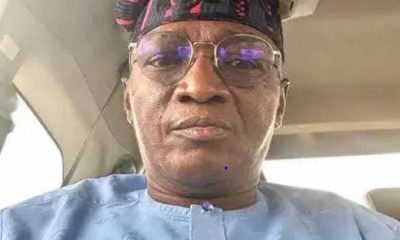
 News16 hours ago
News16 hours agoSAD! APC publicity scribe dies in UK
-

 Politics13 hours ago
Politics13 hours agoNatasha/Akpabio feud: Senate fast progressing in error -Ex-lawmaker, Teejay Yusuf
-

 News4 hours ago
News4 hours agoSecurity Alert: Police alert officers ahead of nationwide protest over living costs, free speech
-

 News17 hours ago
News17 hours agoInmate allegedly killed wife during prison visit
-
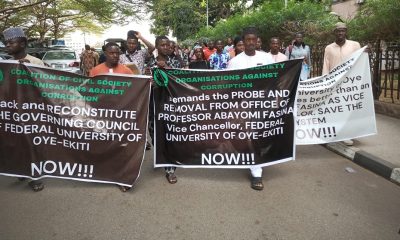
 News16 hours ago
News16 hours agoProtesters call for suspension of FUOYE VC over alleged sexual harassment
-

 Economy17 hours ago
Economy17 hours agoNaira Depreciates Significantly In Official Market
-

 Metro16 hours ago
Metro16 hours agoPlateau attack: 40 more bodies recovered as death toll hits 52






